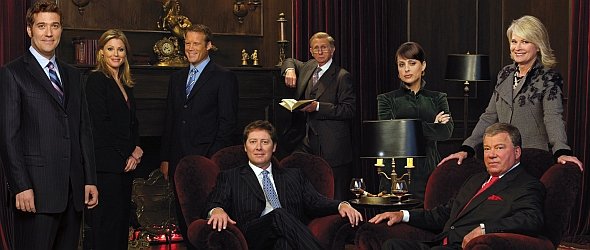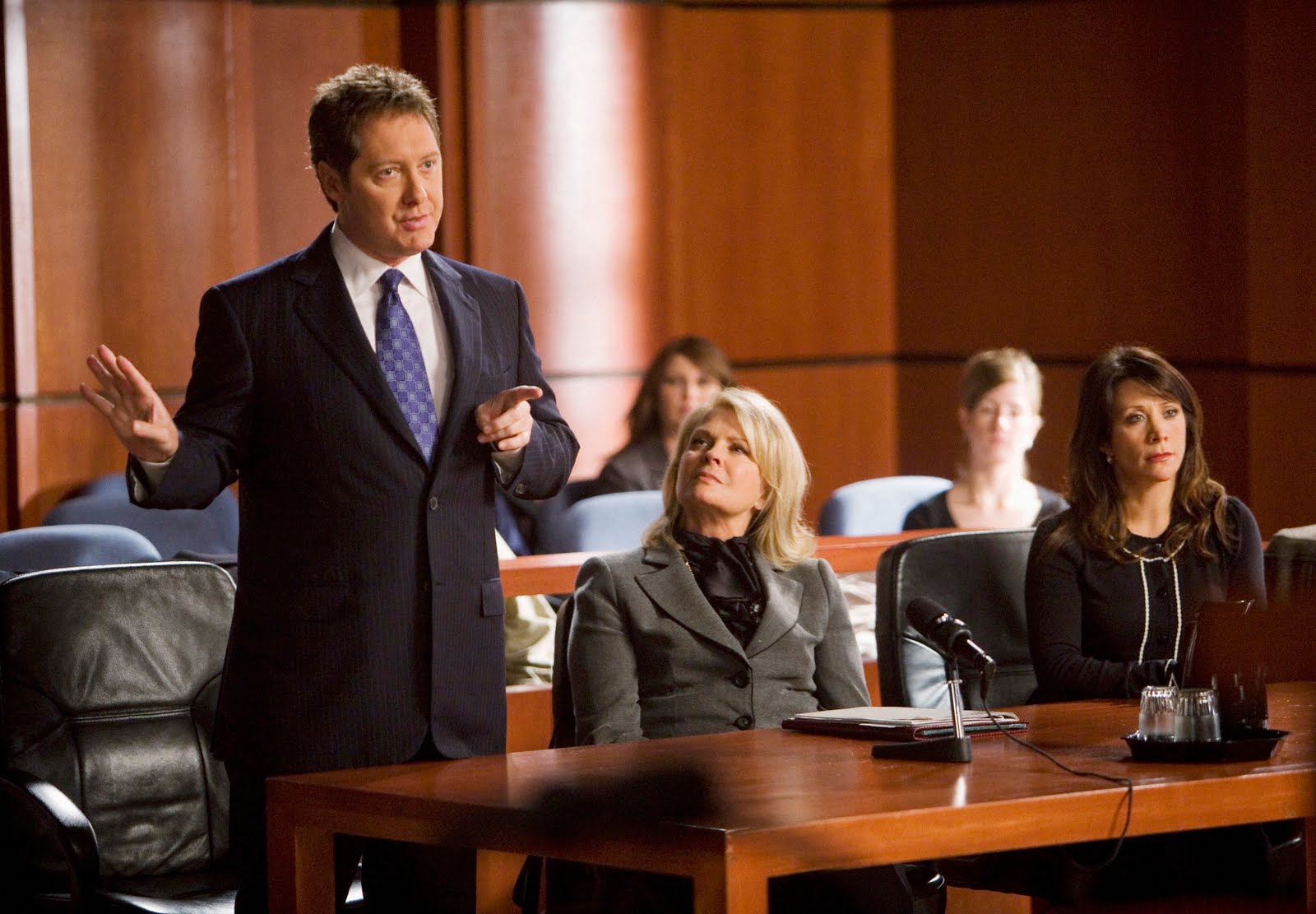By Jalal Uddin Ahmed
Boston Legal was an American legal comedy-drama created by David E. Kelly in association with Fox. It ran on air for five seasons from 2004 to 2008. The show centered around the law firm – Crane,Poole and Schmidt and its lawyers,mainly – Denny Crane,the senior partner at the firm, Alan Shore,an excellent attorney and Denny’s best friend and Shirley Schmidt, another senior partner at the firm.
Boston Legal was essentially a continuation of the final season of The Practice,which introduced the characters of sexually obsessed and unconventional defence attorney Alan Shore (James Spader) and Denny Crane (William Shatner), the senior partner of prestigious Boston law firm Crane, Poole and Schmidt. Critics felt both Spader (and Shatner) revived The Practice in quality. No wonder ABC (which was suffering from a lack of hit series at the time) asked Kelley to create a new series built around Shore and Crane. The show’s initial title was Fleet Street (referring to the Boston address of Crane, Poole et al). But Kelley told “TV Guide” magazine ABC wanted a new name, noting Boston Legal was the suggestion that “seemed to make everybody the most happy.”
Cast and Characters
Premiering on October 4th, 2004, the core cast included Spader and Shatner, along with ‘Practice’ holdovers Lake Bell (as attorney Sally Heep) and Rhonda Mitra (as paralegal Tara Wilson). Mark Valley was also part of the cast as conservative former Marine and lady’s man Brad Chase, who was brought from Crane, Poole and Schmidt’s Washington D.C. office to oversee the increasingly erratic Denny Crane. Managing the operation was Paul Lewiston (Rene Auberjonois), who prided in stability and felt the extra-curricular antics of Crane and Shore were not in the firm’s best interest.
 Alan Shore, despite his quirky personality traits, was effective in defending his clients. His eloquent closing arguments to the jury combined the facts with black humour and his liberal political of view. Shore’s shots against the Bush administration and its policies certainly made for topical cases but didn’t make Boston Legal’s conservative viewers happy.
Alan Shore, despite his quirky personality traits, was effective in defending his clients. His eloquent closing arguments to the jury combined the facts with black humour and his liberal political of view. Shore’s shots against the Bush administration and its policies certainly made for topical cases but didn’t make Boston Legal’s conservative viewers happy.
To balance things out, Denny Crane was a die-hard (but sometimes clownish) conservative, who espoused his views loudly and often. And there was no getting around the fact Boston Legal gave William Shatner his best television series role since Captain James T. Kirk on the original Star Trek. Denny was insensitive, selfish, and obsessed with sex despite his 70-plus years. But his increasing lack of focus, which was later diagnosed as early stages of Alzheimer’s, concerned Alan and others in the firm (Denny referred to his condition as “Mad Cow” disease; he claimed eating red meat was the cause.) Despite the outlandish things he did (and the things he said), Shatner managed to make Denny a sympathetic–and sometimes even loveable–figure.
In early 2005, Candace Bergen (who made her television mark as Murphy Brown) joined the cast as Shirley Schmidt, the founding partner who returned to reverse a drop in litigation at the firm. (It was revealed Shirley and Denny had a romantic affair years earlier; Shirley moved on but Denny never did, always waiting for another chance to bed the aging but still attractive Schmidt.) Shirley also butted heads with the unconventional Alan, who also wanted to sleep with her.
As the seasons passed, there were many comings and goings in the Boston Legal cast. After the first season, RhonaMitra and Monica Potter departed; a new lawyer named Denise Bauer (Julie Bowen) was added. Several new junior associates also joined the show in the second season. By the third season, new attorneys Jeffrey Coho (Craig Bierko) and Claire Simms (Constance Zimmer) arrived (Coho left before the end of the season); Gary Anthony Williams joined the cast in mid-season as the cross-dressing legal eagle Clarence Bell.

Bigger changes took place during Season Four, as Rene Auberjonois and Mark Valley were dropped as regulars (both returned occasionally for future episodes); Bowen and Zimmer were also gone and never returned. John Larroquette (who had won an Emmy playing a different character on The Practice) was added as senior partner Carl Sack, whose job was to establish order at the law firm. He was joined by Saffron Burrows as English attorney Lorraine Weller and Taraji Henson as no-nonsense lawyer Whitney Rome. Actor Christian Clemenson, whose portrayal of bright but socially disabled lawyer Jerry Espenson (he suffered from Asperger syndrome) was seen starting in the second season, became a regular cast member with Season Four. For the shortened fifth season, Burrows left to join the cast of NBC’s short-lived drama My Own Worst Enemy while Williams and Henson also departed.
The series ended with the firm being in economic distress being sold to a Chinese firm and Denny’s name being removed and he himself being fired, with the new name being Chang, Poole and Schmidt. Denny also being warned by the doctor about the seriousness of his Alzheimer’s,decided to get married to Alan to protect himself and his finances(same-sex marriage was legal in the state,although Denny and Alan weren’t homosexuals). It wasn’t a surprise: During the series’ run, Denny and Alan formed a strong friendship; they were seen sitting in overstuffed chairs on the 14th floor balcony of Denny’s office at the end of every episode, puffing away on cigars, enjoying a drink and hashing out the episode’s major plot developments–even making occasional plans for a “sleep over,” It was one of the most credible “bromances” between two men American television had to offer. Denny and Alan also decided to head to the Supreme Court to have permission for the testing of a new drug that can cure Alzheimer’s.
Review
Boston Legal carved a style and tone that was distinctly different from any other drama on broadcast television. Its quirky cases and the lawyers’ “politically incorrect” behaviour blended with serious discussions (and cases) regarding topical issues. Sex was a recurring theme; the mostly male cast was seemingly obsessed with it (both Alan and the aging Denny propositioned a number of women–and not subtly, either), while most of the women who passed through the law firm’s offices were either around for window dressing or were as predatory as their male counterparts. (Bergen’s Shirley Schmidt was the exception.)
Boston Legal, though, is not pretentious. It’s brilliant. In fact, I’d go so far as to say Boston Legal is by the far the best courtroom-drama series yet, far better than David Kelly’s another legal spiegel, Ally McBeal. Both series perform the trick of using flights of far-fetched fancy to liven up the depiction of genuine, often pressing issues. But whereas McBeal’s quirk quotient was so inflated that it left its viewers feeling like the practitioners of some oddly popular fetish, but on the other hand Boston Legal, gets the balance down pat.
Boston Legal was also not afraid to break television’s “fourth wall” and remind viewers that the show was fiction. The real genius of the series, though, consists in the use of Spader’s character to present what are in effect a series of highly critical, nuanced love letters to the idea of America. Hard on Bush, harder on the causes of Bush, the series draws its principally stateside viewers gently back into contact with the dreamlike vision in which their nation was originally conceived. Watching each episode, whether it concerns the death penalty, human body part trafficking, or simply Spader and Shatner’s unconsummated love, is to remember what we lack today. And I don’t mean good television.
For all its quirks – and it had many – Boston Legal also had heart, brains and an ability to laugh at itself. Boston Legal was probably one of David E. Kelley’s best dramas because all his trademark elements were seamlessly blended into a series that stood out from the competition. To quote Denny Crane: “Love us or hate us, there’s no place like us.”




